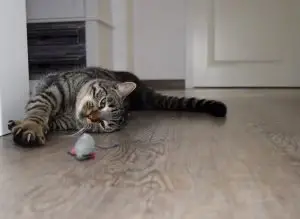What you can do
- Use cat toys to avoid being scratched
- Buy scratching posts for your kitten and teach it how to use them
- Trim your kitten’s claws every few weeks, or take your kitten to a vet to do it
- Don’t declaw your kitten
If you’ve recently gotten a new kitten, it might have surprised you how such a soft and fluffy creature can have such murderous claws. Suddenly neither your furniture nor your skin is safe from the vicious scratching of the little tiger. Your kitten’s claws are too sharp and you might even start regretting you brought it into your home.
But I wouldn’t despair just yet. Your kitten isn’t scratching you to spite you; it’s only doing what comes naturally to it. Regardless of their size, cats are predators and they need their outlet — and sometimes that outlet happens to be you. But with a few tips and tricks, you will learn what to do when your kitten’s claws are too sharp, and you’ll enjoy its company once again.
Use Cat Toys
Kittens are very energetic and playful — they are a lot like human children. When they are awake (only about 4 hours a day!), they need to explore, jump and hunt. And if you keep them inside, where the environment isn’t particularly stimulating, kittens will see your feet, legs, and hands as their natural prey.
Luckily, just like children, kittens are easily distracted. If you’ve had enough of their scratching and biting, I’d recommend you invest in some cat toys. See our pick. You can find all kinds of rubber mice, cat teasers, lasers and balls on the market, but you can also make a toy on your own. Cats aren’t very demanding in that regard — it only matters that they can chase it.
If you have a tablet, you could even install apps made specifically for cats. In my experience, these will keep them confused and distracted for a while. Plus, watching your kitty try to catch a virtual fish is hilarious.
Buy Scratching Posts for Your Kitten
Furniture is probably a major point of disagreement between you and your kitten. You believe it should look nice and new, and your cat believes it should be used for claw sharpening. How should you resolve this issue peacefully?
First, keep in mind that cats only scratch your furniture because it helps them shed their claws. It’s no use getting angry with them — they have to do it either way, and your reactions could damage your bond. Instead, buy your kitten a scratching post and teach it how to use it. I can give you three tips if you aren’t sure how to do that:
1. Play Around the Scratching Post
If you get your kitten to use its claws on the post while playing, it might soon discover what a great place that is for scratching. You could even scratch the post yourself — your kitten might decide to follow your example.
2. Use Catnip
Most cats love catnip. Sprinkle some of it on the base and the top of the scratching post and your kitten will be drawn to it. When it licks up the catnip, it will start kneading, and after a few tries, it will remember that the posts are great for sharpening its claws.
3. Give Treats
When your kitten behaves the way you want it to, reward it with some treats. Encourage it when it initially shows interest in the post, and then keep it up as it discovers how to use it. That way, using the post will become a positive experience for your kitten.
Kitten’s Claws Are Too Sharp? Trim Them!
Trimming your kitten’s nails won’t stop its scratching behavior, but it will render it a little more harmless. Being scratched with trimmed nails is less painful, and your furniture will also be protected for some time. Also, regular trimming benefits your kitten as well — it will never suffer from ingrown nails.
But kittens are notoriously unable to sit still. How should you then trim your kitten’s nails without accidentally hurting it? You’d be surprised to find out that it’s not as difficult as it sounds, as long as you follow my advice:
1. Accustom Your Kitten to Being Held
A week before you decide to trim your kitten’s nails, it might be wise to start teaching it to lie still in your lap. I’d recommend you do it when it’s sleepy at first, and reward good behavior with treats. Make sure it feels safe and comfortable with you.
In my experience, cats dislike it when you touch their feet. Since trimming nails involves just that, practice holding your kitty’s paws for a while. After it gets more accustomed to it, start gently pressing its toes to expose its claws.
2. Use Sharp Clippers
Before you clip your kitten’s nails for the first time, make sure to find sharp nail clippers. These will speed up the process and won’t crush your kitten’s nail, which would be painful.
3. Cut off Only the Tips
Just like when you trim your nails, you don’t want to cut off too much. Cut off the very tip of the nail and avoid the pinkish area called the quick. The quick contains blood vessels and nerve endings, so cutting it would cause your kitten to protest in pain.
If you do accidentally cut the quick, don’t worry — your kitten will be fine. Just make sure to stop the bleeding and apologize to your upset kitty by giving it treats.
4. Treats Are the Key to Your Kitten’s Heart
After each nail you cut, give your kitten a treat. That way, even if it doesn’t particularly enjoy the nail trimming experience, your kitten will associate it with something good. And after a few such experiences, it will become more cooperative and the process will be smoother.
Don’t Declaw If Your Kitten’s Claws Are Too Sharp
Maybe you’ve heard that instead of trimming your cat’s nails every few weeks, you can declaw it and solve the problem permanently. While it may indeed solve your problems with scratching, it would cause a host of problems for your cat.
Claws are essentially your cat’s fingers. It uses them to latch onto different surfaces when exercising and stretching. When it uses the litter box, your kitten will bury its waste with claws. Declawing makes both of these activities painful, and it might lead to behavioral issues.
Moreover, claws are your kitten’s primary weapons. Without them, cats become vulnerable to attacks from other cats, dogs, or predators. Even if your kitten is a strictly indoor cat, it could slip by you and run out. Then it could only defend itself using its teeth, and that is not nearly efficient enough.
So instead of risking your kitten’s life and happiness, just don’t declaw it. If your cat’s claws are too sharp, just use any of the humane options I already mentioned to solve the problem.
Final Thoughts
Cats belong to the same family as tigers and lions. And although they are smaller than their more dangerous cousins, their instincts are similar enough. Therefore, when you bring a kitten to your home, you are bound to deal with some scratching.
But instead of getting angry and punishing your furry friend, use your newfound knowledge to make the inevitable scratching a little more bearable. You will be happier, your bond with your pet will be stronger, and even if your kitten’s claws are too sharp, they won’t turn against you as often.
[su_box title=”Affiliate Disclosure”]This website is supported by its readers. Please assume that all links are affiliate links. If you make a purchase from one of the links we will make a commission from Amazon. Thank you.[/su_box]








